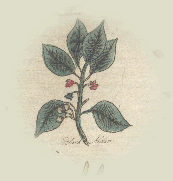CULPEPER'S COMPLETE HERBAL

BLACK ALDER TREE
Description. This tree seldom grows to any large size, but shoots out into many small branches, covered with a reddish brown bark; it bears broad, roundish, but sharp pointed leaves, of a bright green, and veined, about the bigness of the leaves of the pear-tree. The flowers are whitish, and grow on the younger brances, on the lower part next the trunk, several together, at the setting on of the leaves, small and white, and are preceded by small round berries, about as big as juniper berries, green at first, then red, and when ripe, blackish; full of a greenish juice, of a bitter taste, with two flat seeds in each berry.
Place. This is rather a shrub than a tree. It is frequent in moist woods, and the berries are sometimes mixed amongst those of the buckthorn, by such as gather them for sale.
Time. It flowers in May, and the berries are ripe in September.
Government and virtues. Black-berry bearing Alder is a tree of Venus, and perhaps under the celestial sign Cancer. The inner rind is all that is used in medicine; this is yellow, and tinges the spittle like rhubarb. It purges serous and bilious humours, and is recommended for the dropsy and the jaundice. In Yorkshire they braise the fresh bark in a mortar with vinegar, and apply it outwardly for the itch, with it cures very safely. The best way to give it is in a decoction. Boil an ounce of the dried bark in a quart of water, and throw in at least two drachms of ginger, and a few carraway seeds; let the patient proportion the quantity to his strength, beginning with a small draught, and increasing it as he shall find occasion. The dried bark boiled with agrimony, wormwood, dodder, hops, and some fennel, with smallage, endive, and succory roots, and a considerable draught taken every morning for some time together, is very effectual against the dropsy and the jaundice, especially if some suitable medicines have been taken before. All this must be understood to be performed by the dried bark; for the fresh green bark taken inwardly, provokes strong vomitings, excites pains in the stomach, and gripings in the belly, yet mixed with the above, or other aromatics, and let stand, and settled two or three days, until the yellow colour is turned black, its operation is more gentle, strengthening the stomach, and procuring an appetite to eat. The outward bark possesses a contrary virtue; it binds the body, and is very good to lessen immoderate fluxes, but this also must be dried first, or it will prove hurtful. A decoction in vinegar cures scabs on the head, kills lice, eradicates humours and runnings in man or beast, by drying them up in a short time. It is singularly good to wash the teeth, to remove the pains in them, to fasten those that are loose, to cleanse them and keep them sound. The leaves are good fodder for kine, to make them give more milk; laid fresh on swellings, they ease the pain, dissolve them, and stay inflammations; placed under the bare feet of weary travellers, refreshes them, and eases the galling heat; gathered with the morning dew, and strewed about rooms pestered with fleas, they soon gather up the vermin, so that they may be swept out, and the room cleared.
If, in the spring, you use the herbs before mentioned, and to an handful of each add another of elder-buds, and having bruised them all, boil them in a gallon of good table, or home-brewed beer, when it is new; and after boiling half an hour, add three gallons more, and let them work together, you will have an excellent spring drink; half a pint of which, every morning fasting, is a good and gentle purge to consume the phlegmatic quality the winter has left behind, to keep the body open, and consume those evil humours which the heat of summer will readily stir up.